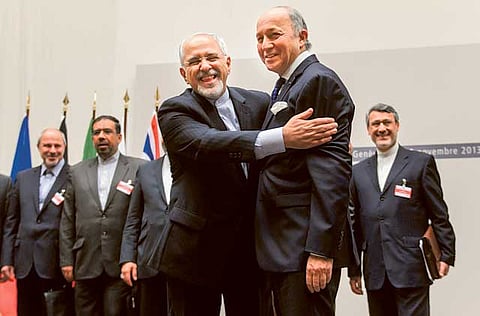Deal strengthens Syria ahead of Geneva talks
Iran deal hailed by Syria as “historic” is criticised by Israel as a “historic mistake”

Dubai: The interim deal struck by Iran and the six world powers over Tehran’s nuclear programme has guaranteed Iran a seat in the expected peace conference on Syria and enforced Tehran’s influence on its only Arab ally, experts on Iran and security issues said. But the deal that was hailed by Syria as “historic” was also criticised by Israel, which has been alarmed by Iran’s nuclear programme, as a “historic mistake”.
“Undoubtedly, the [nuclear] agreement will push towards active Iranian participation in Geneva 2,” said Mahjoub Zweiri, an expert on Iran and a political science professor at Qatar University.
Geneva 2 is expected to be held in the near future and bring together the Syrian government and the opposition for the first time since the nearly three-year-violence cycles erupted in Syria and killed more than 120,000 people.
“Tehran feels victorious not only because the interim agreement [six-month nuclear agreement] emboldens them [Iranians], but also because of the success on the ground in Syria,” said Theodore Karasik, Director of Research and Consultancy at the Dubai-based Institute for Near East and Gulf Military Analysis (INEGMA).
Iran and its allies in Lebanon, namely Hezbollah, have been taking part in the fighting in Syria defending the Syrian regime of Bashar Al Assad. In recent months, they have made significant gains on the ground with the retreat of the rebel forces.
Syria “considers it to be a historic accord which guarantees the interests of the brotherly Iranian people and acknowledges their right to the peaceful use of nuclear energy,” its foreign ministry was quoted by local media as saying.
The deal reached in Geneva was “proof that political solutions to crises in the region are the best way to guarantee security and stability, far from any foreign interference’,” the ministry said.
As for whether the Iranian nuclear deal will impact negotiations to resolve the Syrian conflict, analysts were cautiously optimistic. Western powers and many regional countries will be “closely” watching the behaviour of Iran and its allies in both Syria and Lebanon. However, Zweiri said he was not optimistic that the nuclear deal would boost the opposition in Syria.
“Because Iran gave concessions on the nuclear issue, it is unlikely it will give concessions on Syria,” Zweiri said. The situation in Syria, the only Arab ally to Iran, and its security ramifications were among the main factors behind the Iranian acceptance to the agreement, according to Zweiri.
“The whole agreement is a tactic by all parties to calm down the situation [internationally],” he said.
“For the Americans and the Europeans, they have other issues such as the agreement with Afghanistan, situation in Iraq and economic situations,” as well as the Syrian crisis.
“Each party wants to buy time.I don’t think the agreement is great. The devil of the details will surface during the implementation,” he added.
The agreement is very “interesting and important, but there is such a long way to go towards the full-fledged agreement,” said Karasik.
Meanwhile, Israel, which is believed to have a considerable nuclear arsenal, has criticised the agreement.
“What Israel is doing is trying to blackmail and pressure the US to put more pressures, along with other western powers, on Iran to get more concessions”, said Zweiri.
Israel will adopt the position of “watch and see and complain a lot,” said Karasik, adding that the agreement is actually a good thing for Israel as Iran and Hezbollah will be dissuaded from threatening Israel due to international attention.
Sign up for the Daily Briefing
Get the latest news and updates straight to your inbox



